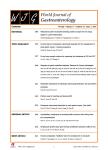版权所有:内蒙古大学图书馆 技术提供:维普资讯• 智图
内蒙古自治区呼和浩特市赛罕区大学西街235号 邮编: 010021

作者机构:Department of Virology School of Medicine Ahvaz Jundishapur University of Medical Sciences Department of Medical Virology School of MedicineHamadan University of Medical Sciences The Persian Gulf Tropical Medicine Research CenterBushehr University of Medical Sciences
出 版 物:《World Journal of Gastroenterology》 (世界胃肠病学杂志(英文版))
年 卷 期:2019年第25卷第1期
页 面:42-58页
核心收录:
学科分类:10[医学]
主 题:Hepatitis C virus Core protein Transforming growth factorβ Vascular endothelial growth factor Wnt/β-catenin Cyclooxygenase-2 Peroxisome proliferatoractivated receptorα Hepatocellular carcinoma
摘 要:Hepatocellular carcinoma(HCC) is the fifth most common cancer, and hepatitis C virus(HCV) infection plays a major role in HCC development. The molecular mechanisms by which HCV infection leads to HCC are varied. HCV core protein is an important risk factor in HCV-associated liver pathogenesis and can modulate several signaling pathways involved in cell cycle regulation, cell growth promotion, cell proliferation, apoptosis, oxidative stress and lipid metabolism. The dysregulation of signaling pathways such as transforming growth factor β(TGF-β), vascular endothelial growth factor(VEGF), Wnt/β-catenin(WNT), cyclooxygenase-2(COX-2) and peroxisome proliferator-activated receptor α(PPARα) by HCV core protein is implicated in the development of HCC. Therefore, it has been suggested that this protein be considered a favorable target for further studies in the development of HCC. In addition, considering the axial role of these signaling pathways in HCC, they are considered druggable targets for cancer therapy. Therefore, using strategies to limit the dysregulation effects of core protein on these signaling pathways seems necessary to prevent HCV-related HCC.